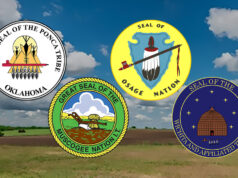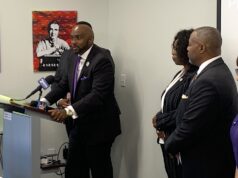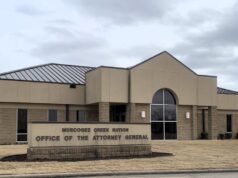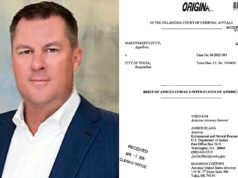Despite constitutional concerns about the tribe’s prohibition on recognizing same-sex marriage, a Muscogee National Council committee rejected a bill 1-3 Thursday that would have guaranteed equal recognition to married same-sex couples.
Councilpersons Sandra Golden, Nelson Harjo and Patrick Freeman all voted against the legislation, with Councilwoman Dode Barnett making the sole vote in favor of recognizing same-sex marriages during the nation’s Business, Finance and Justice Committee meeting.
The bill — NCA 24-018 — was authored by Barnett, who was reelected to the council in 2023 after previously serving from 2012 through 2017.
“I’ve gotten a lot of calls this week over this legislation,” Barnett said during Thursday evening’s meeting. “Most are in favor. I only got two calls that were against, and those conversations were really respectful.”
The law would have struck “with a person of the opposite sex” from Title 6, Section 2-104, the statute listing requirements for recognized marriages in the Muscogee Nation. It also would have struck Section G, which explicitly prohibits the recognition of same-sex marriages granted in other jurisdictions.
“Same gender marriage (is) prohibited,” the Muscogee code states. “A marriage between persons of the same gender performed in another Indian Nation or state shall not be recognized as valid and binding in the Muscogee (Creek) Nation.”
Barnett said that part of the tribal code infringes on Muscogee citizens’ rights as Americans and appears to conflict with protections in the Muscogee Nation Constitution.
“This legislation actually would bring us to the point where we are not infringing on our citizens’ U.S. constitutional rights,” Barnett said.
Golden, Harjo and Second Speaker Thomasene Yahola-Osborn each spoke against the legislation, with Golden kicking off the opposition with a question to Barnett.
“Why are you doing this?” Golden asked. “I also got a lot of calls from churches and ceremonial grounds, and they said, ‘Do not pass this.’”
Harjo spoke the longest in opposition, invoking traditionalism while pointing out that Muscogee citizens were free to marry in the state of Oklahoma.
“As a nation within a nation, we are made up of only Muscogee people. We have a tradition we’ve always followed, and we have a culture that we’ve always practiced,” Harjo said. “If they want to get married in the state, they can.”
Harjo also argued that the Muscogee Nation faces bigger issues and that infighting over same-sex marriage is counterproductive.
“We’re all that we have right now,” Harjo said. “We’ve got a big fight on our hands of other people trying to come in, and this makes it even more difficult now because it would make a fight that would happen internally and we’ve got enough to deal with right now on a bigger scope than to deal with this particular issue.”
Yahola-Osborn read a pre-written statement voicing her opposition to the bill.
“I have received more calls on this legislation than any legislation since my tenure as a National Council representative,” Yahola-Osborn said. “I would ask the committee to consider who we are as a people and our culture when casting your vote.”
Barnett: ‘It was palpable, the disdain and the disapproval’
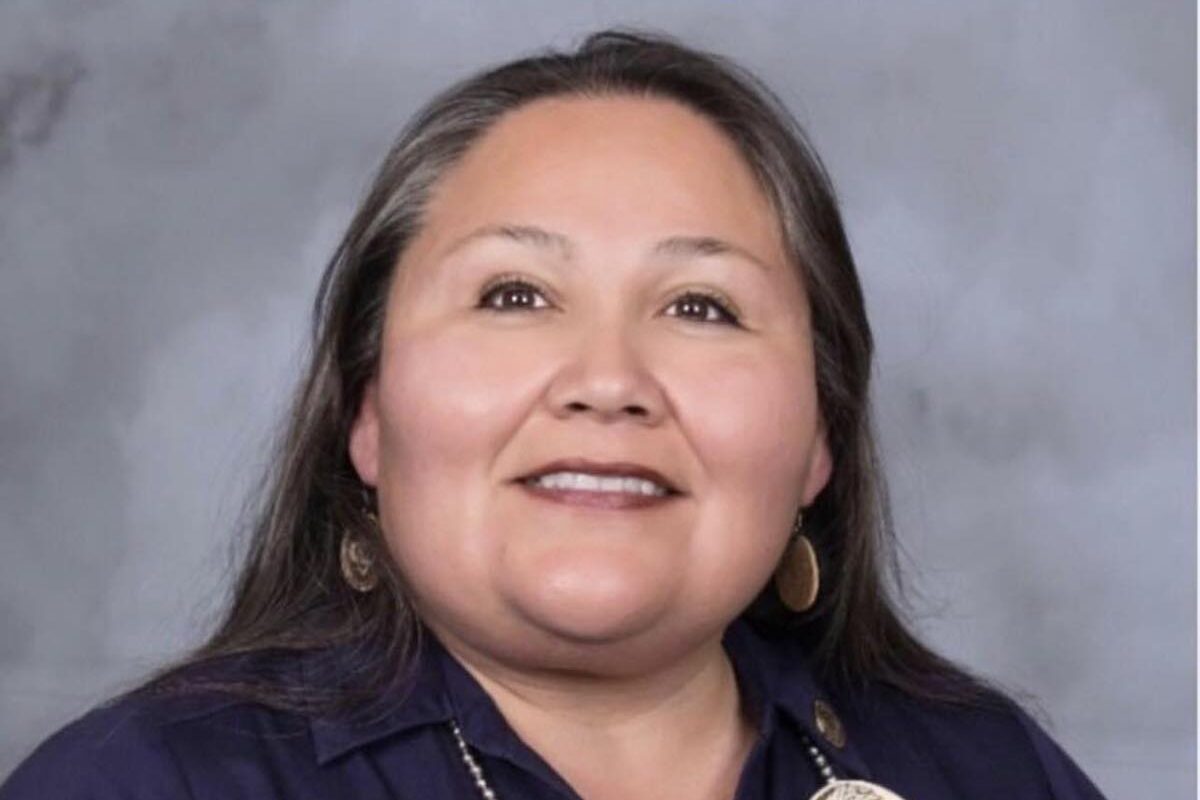
In an interview Friday, Barnett questioned whether valuing traditionalism actually justifies the ban.
“Same-sex marriage was not mentioned at all in our law until 2006,” Barnett said. “So it’s a relatively new concept that we’re banning same-sex marriage. (…) I went to our libraries, and I’ve asked our librarians in the archives how same-sex couples or homosexuality in general was addressed, and it’s not in there.”
Barnett said it is her understanding that same-sex couples can access the same tribal programs as opposite-sex couples under current Muscogee Nation law.
“There are no programs that same-sex couples cannot apply for,” Barnett said. “The only thing that would change procedurally is that same-sex couples could go to the district court and apply for a marriage license.”
Asked if the opposition to her bill surprised her, Barnett said she did not poll her fellow councilpersons or committee members before the vote and that about 30 people attended the meeting in opposition to the bill.
“It was palpable, the disdain and the disapproval — and I would even say the hate — in the room when my bill was being discussed, and that’s just a tiny fraction of what the LGBTQ population experiences,” Barnett said. “My heart goes out to our people that this meeting and the vote hurt.”
Constitutional issues with current law raised
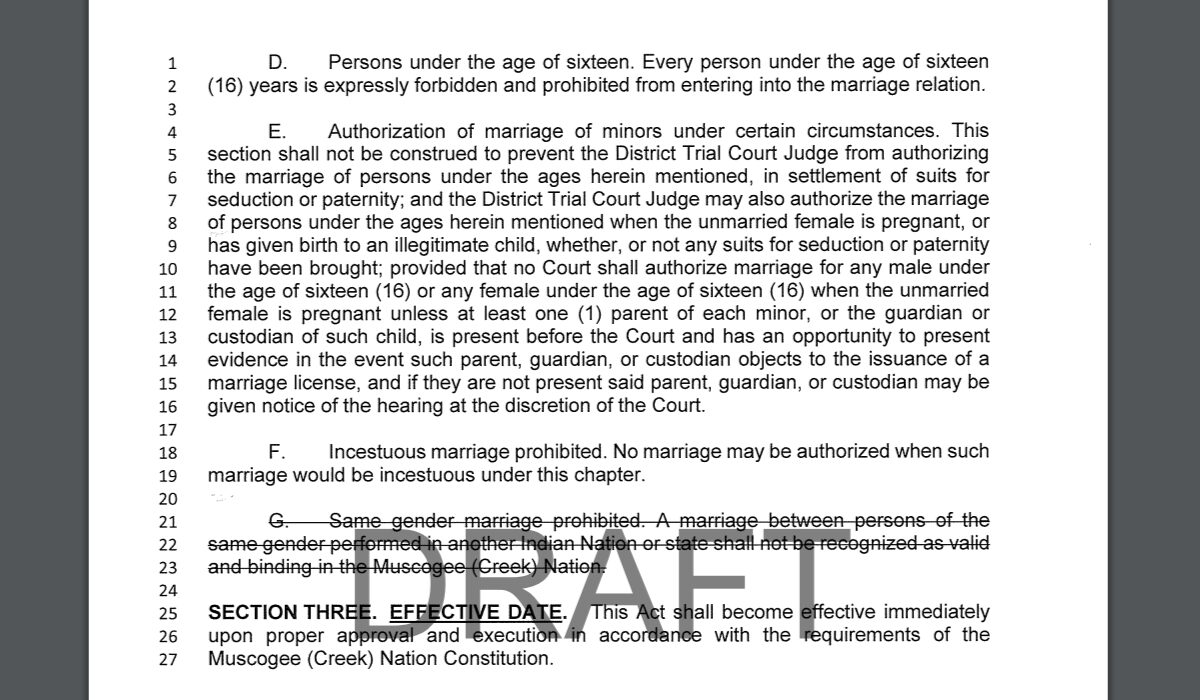
During debate Thursday evening, Barnett referenced concerns that the nation’s current laws might violate the Muscogee Nation Constitution. Article 2, Section 2 bars “abridge[ing] the rights and privileges of individual citizens of The Muscogee (Creek) Nation enjoyed as citizens of the State of Oklahoma and of the United States.”
“Our constitution says we cannot deny our Creek citizens their U.S. constitutional rights,” Barnett said.
Barnett’s argument corresponded to a similar dispute in the Choctaw Nation courts that eventually led to that tribe’s Supreme Court recognizing same sex marriage in May 2023, although Barnett said Friday she was unaware of the Choctaw court decision.
“Whether you agree or disagree that same-sex unions should be legal is irrelevant,” Barnett said Friday. “They are legal under the U.S. Constitution, and when we were elected and we were sworn into office Jan. 6, we swore to uphold our (Muscogee Nation) Constitution. Our Constitution explicitly states that we cannot deny any citizen their U.S. constitutional rights.”
The Choctaw Nation’s top court found the law barring the recognition of same sex couples violated the Choctaw Nation’s Constitution, which contains similar language to the Muscogee Nation Constitution.
“Nothing in this Constitution shall be interpreted in a way which would diminish the rights and privileges that tribal members have as citizens of this nation, the state of Oklahoma, the United States of America or under any act of the Congress of the United States,” reads Article 4, Section 1 of the Choctaw Constitution.
The Choctaw Nation Supreme Court ruled that the tribe’s prohibition on same-sex marriage diminished the rights of tribal members as citizens of the United States in light of the U.S. Supreme Court’s Obergefell v. Hodges decision, which legalized same-sex marriage nationally.
A similar argument could be made in Muscogee Nation courts, and it would then be up to the Muscogee Nation’s judicial branch to determine if the tribe’s ban on recognizing same-sex marriage violates the constitutional rights of tribal members.
Using the nation’s court system to seek legal recognition would not be a new strategy, as the Muscogee Freedmen have pushed for citizenship rights within the nation through litigation. In September, the Muscogee Nation District Court ruled in favor of the descendants of Freedmen, but that case was appealed and is currently pending before the Muscogee Nation Supreme Court.
Follow @NonDocMedia on:
Facebook | X | Text or Email
Same-sex marriage slowly recognized by tribes
While the June 2015 Obergefell decision legalized same-sex marriage nationally and across the United States, it did not legalize or mandate recognition in tribal nations. An 1896 U.S. Supreme Court case, Talton v. Mayes, held that protections of the U.S. Constitution do not apply to tribal governments, with the court noting that tribal governments and their laws predate the U.S Constitution. In 1968, Congress passed the Indian Civil Rights Act, which mandated tribes provide most of the protections of the Bill of Rights to individuals in tribal court, although Congress did not include the Second Amendment or Third Amendment in the protections.
Since Obergefell, some tribal governments have recognized same-sex marriage through varied means. In 2016, the Cherokee Nation recognized same-sex marriage through an attorney general’s opinion written by former Attorney General Todd Hembree. In 2017, the Osage Nation voted to recognize same-sex marriage through a referendum. In 2019, the Chickasaw Nation updated its code to recognize same-sex marriage. In 2023, the Choctaw Nation recognized same-sex marriage through litigation.
Barnett said future challenges of the Muscogee Nation’s same-sex marriage prohibition are “inevitable.”
“Whether I had introduced this legislation or not, at some point it was going to come up,” Barnett said. “It really would be up to citizens whether or not to file lawsuits in response to there being a same-sex marriage ban. I did my part trying to change the law. I failed. Now it’s probably up to the citizens themselves if they want to advocate and press for those rights.”











